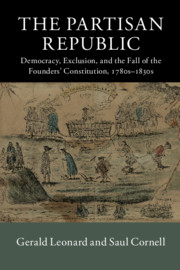(Source: CUP)
Cambridge
University Press is publishing a new book on constitutional change in the US’ Founding Era.
ABOUT THE BOOK
The Partisan
Republic is the first book to unite a top down and bottom up account of
constitutional change in the Founding era. The book focuses on the decline of
the Founding generation's elitist vision of the Constitution and the rise of a
more 'democratic' vision premised on the exclusion of women and non-whites. It
incorporates recent scholarship on topics ranging from judicial review to
popular constitutionalism to place judicial initiatives like Marbury vs Madison
in a broader, socio-legal context. The book recognizes the role of
constitutional outsiders as agents in shaping the law, making figures such as
the Whiskey Rebels, Judith Sargent Murray, and James Forten part of a cast of
characters that has traditionally been limited to white, male elites such as
James Madison, Alexander Hamilton, and John Marshall. Finally, it shows how the
'democratic' political party came to supplant the Supreme Court as the nation's
pre-eminent constitutional institution.
ABOUT THE AUTHOR
Gerald Leonard,
Boston University
Gerald Leonard
is Professor of Law at Boston University School of Law and author of The
Invention of Party Politics: Federalism, Popular Sovereignty, and
Constitutional Development in Jacksonian Illinois (2002).
Saul Cornell,
Fordham University, New York
Saul Cornell is
the Paul and Diane Guenther Chair in American History at Fordham University,
New York, and author of The Other Founders: Antifederalism and the Dissenting
Tradition in America, 1788–1828 (1999) and A Well Regulated Militia: The
Founding Fathers and the Origins of Gun Control in America (2006).
TABLE OF CONTENTS
Acknowledgments
Introduction
1. The new constitution
2. The federalist constitution and the
limits of constitutional dissent
3. The democracy vs the law: the role of
the federal judiciary, 1789–1815
4. The paradoxes of Jeffersonian
constitutionalism
5. The white democracy
6. The Marshall Court, the Indian nations,
and the democratic ascendancy
Conclusion: the constitutional triumph and
failure of the democratic party
Bibliographical essay
Index.
More information here


No comments:
Post a Comment